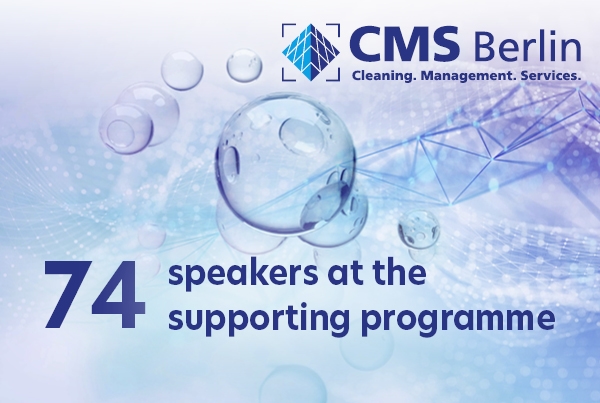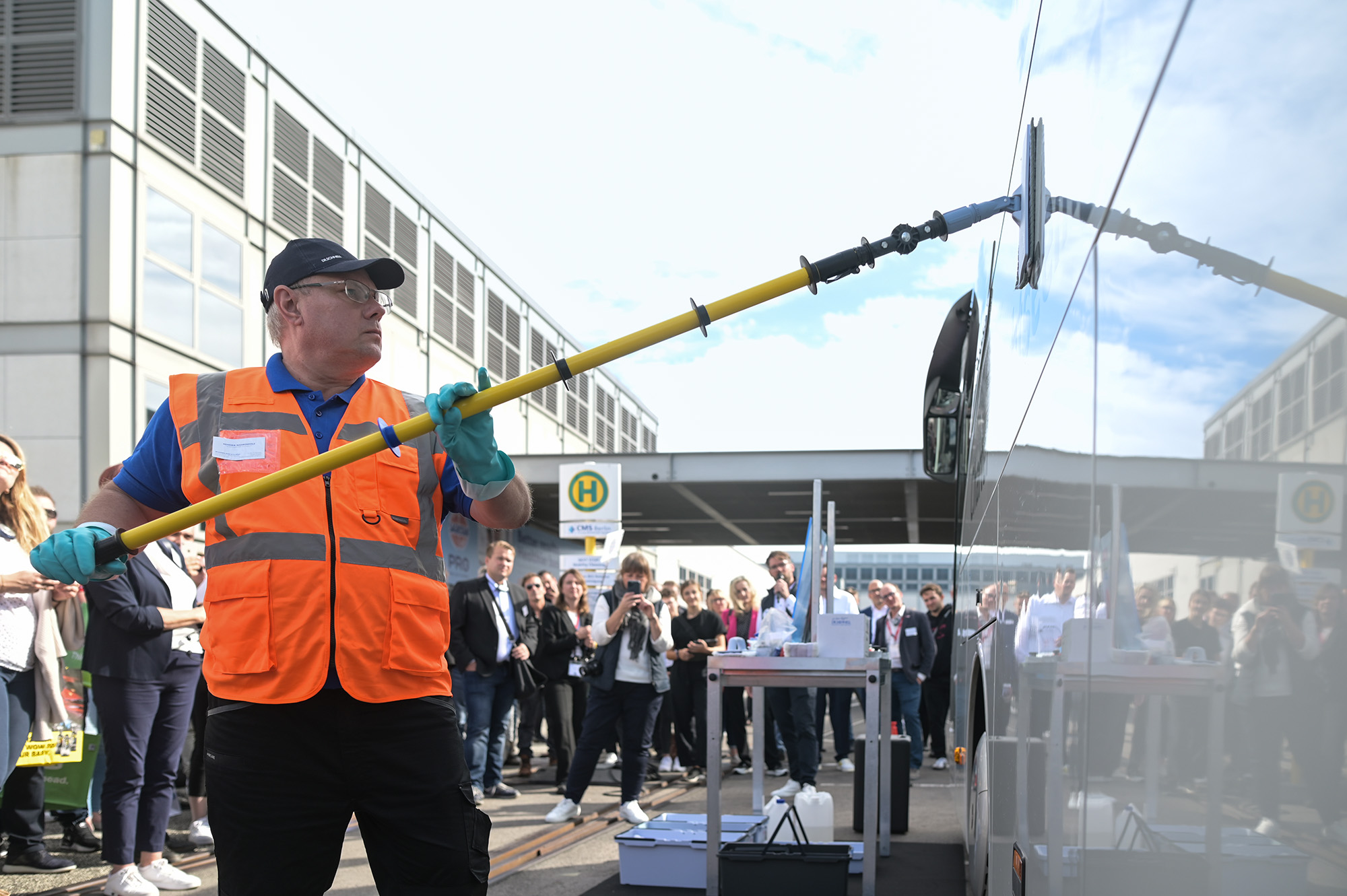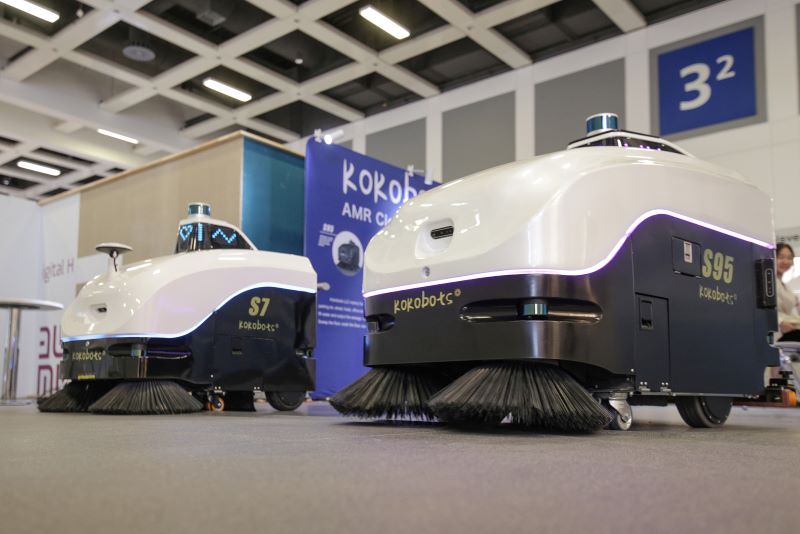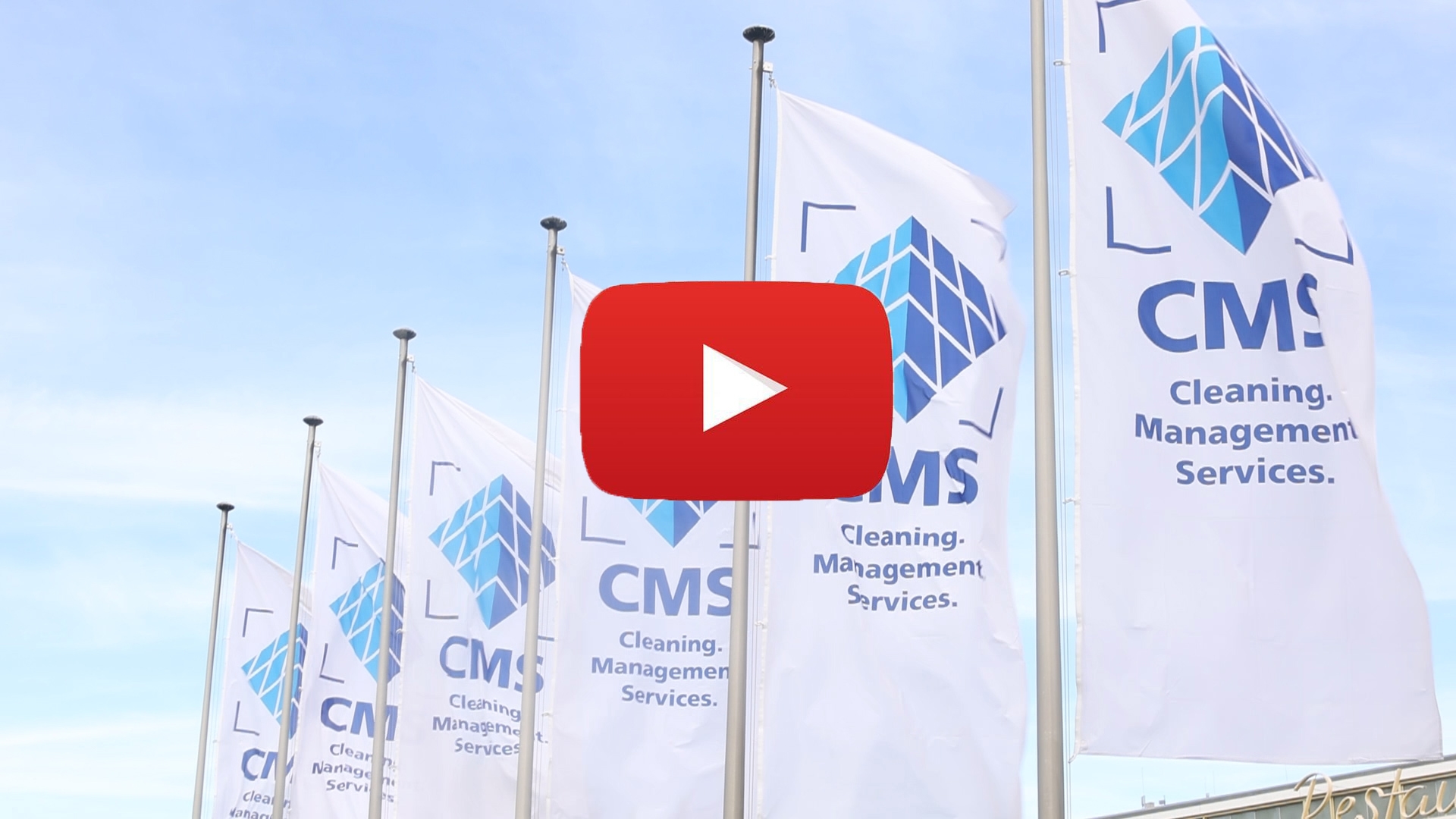Seiteninhalt
Presse-Information
CMS Berlin Update - Day 3
Number of the day

Mobility Cleaning Circle: how cleaning public transport vehicles is becoming sustainable
Whenever trains, buses or aeroplanes need cleaning it is like a Formula One pit stop, said Alexander Bernhard, marketing director, International, for Tana Chemie AG. It has to be as quick and efficient as possible and ideally should be eco-friendly as well.
Bernhard’s comment summed up yesterday’s Mobility Cleaning Circle (MCC) in a nutshell. It marked the third occasion the two leading trade fairs CMS Berlin and InnoTrans had invited representatives of the cleaning industry and transport sector to take part in an exclusive dialogue in order to discuss the specific challenges and solutions involved in cleaning public transport vehicles. This year’s main topic was sustainability.
Attention to cleaning at the vehicle design stage
“Sustainability issues concern us all: customers, suppliers and us as service providers“, said Tom Dreiner at the panel discussion which kicked off the MCC at the Marshall Haus. His company had set itself the goal of becoming carbon-neutral by 2024, said Dreiner, managing director, transport maintenance and building cleaning services at WISAG Gebäudereinigung Holding GmbH & Co. KG. It would cost a lot of money, and ultimately the customer would have to be willing to pay for it. It was important to take a top-down approach to sustainability, with company owners and executives needing to set clear targets and sell the idea to co-workers. There was also a potentially big advantage to be had from integrating the supply chain.
Ramona Belkot, head of vehicle and maintenance management at metronom Eisenbahngesellschaft mbH, echoed that view. “Looking at a vehicle from the inside one has to ask what the manufacturers were thinking.“ Trains had hundreds of “nooks and crannies“ that were inaccessible for cleaning. In her opinion it would help if manufacturers paid attention to cleaning aspects at the vehicle design stage. A refunding system for cleaning product packaging would also be of use. And even if passengers couldn’t see whether a vehicle had been cleaned sustainably or not, “we have to press on with it for our own sake.“ Ultimately, sustainable solutions were often more economical than conventional options.
Sustainable cleaning products are equal value for money
Enrico Sosinski, COO of DR. SCHNELL GmbH & Co. KG confirmed this too. Vehicles were fitted with a lot of very sensitive materials, which was why manufacturers had to balance material compatibility, sustainability and economics with their cleaning products. However, sustainable cleaning products had recently made up significant ground. Ten years ago it would have been unthinkable to use acid-free products for cleaning outer vehicle surfaces. Nowadays, DR. SCHNELL had neutral cleaning products as part of their ECO Collection. And while eco-friendly products used to be more expensive and less efficient than conventional options, they were now equal value for money.
Trade fair tour with numerous innovations
That was exactly what was highlighted during the trade fair tour which took place after the panel discussion and networking lunch. It kicked off with a live demonstration of cleaning the exterior of a coach from DB Regio Ost. This took place between Halls 1.2 and 3.2, with DR.SCHNELL presenting its Purol N-Dry system for a manual, three-stage drip-free cleaning of trains and buses.
Afterwards, the programme featured visits to six other companies who displayed numerous innovations for making cleaning public transport vehicles as easy and sustainable as possible. A few examples:
Tana Chemie presented a snap-on system for cleaning products. One cartridge containing water and another filled with a concentrate snap in beneath a foam nozzle which automatically produces a 100:1 foam mixture. Cleaning solution cartridges can be swapped depending on material requirements. The individual bottles can be carried by the user in a belt. (Hall 4.2, Stand 214)
With its Tork PaperCircle service, Essity Professional Hygiene recycles paper hand towels that would otherwise be disposed of as industrial waste. Instead, companies are employed to separately collect the used paper hand towels in order to recycle them in a special process. Following this example, companies could reduce their carbon footprint by 40 per cent.
IGEFA SE & Co. KG presented its range of sustainable products and its ingreen management report, which companies can employ to analyse how sustainable their procurement methods are and subsequently make improvements.
DR.SCHNELL presented its sustainable Ecoline range. Plastic-free packaging and consistently reducing it represents the most important path to minimising carbon footprints. In addition, the company no longer sources its citric acid from Asia, and instead from Austria or Belgium. This alone has resulted in DR. SCHNELL reducing its annual carbon footprint by 500 tonnes.
Kärcher’s focus is on its battery range. Only two battery types are required for powering an entire range of cleaning machines, including a backpack vacuum cleaner for the inside of aeroplanes, buses and trains, as well as machines for outdoor cleaning purposes and cleaning robots. The advantage of these cordless devices is that they do not hinder working in tight indoor spaces.
Kenter presented its SAO system, which is short for Stabilized Aqueous Ozone. Using electricity and water it produces ozone, which is ideal as a cleaning product for maintenance purposes.

Independent: the latest generation of cleaning robots at CMS Berlin
Cleaning robots are a reflection of how the entire industry is in transition. Choices range from robot vacuum cleaners to imposing floor cleaning machines. Not only do cleaning robots help save time, they are also resource-efficient. On Tuesday the Scrubber 50 Pro from Gausium (Gaussian Robotics Holdings Limited, Hall 2.2, Stand 131) won the Purus Innovation Award (PIA) in the Large Machines category. AI control allows it to independently detect dirt particles, thereby making it more efficient. It is economical with water, which it also able to recycle.
A rounded product
It will be spring 2024 before the KIRA CV 50 robot vacuum cleaner from Alfred Kärcher (Hall 3.2, Stand 100) arrives on the market. However, visitors to CMS Berlin can already gain an impression of it for themselves. This robot is suitable for cleaning small and medium-sized carpeted floors and hard surfaces. Coloured light strips indicate the robot’s activity, making it visible in dark rooms. A display allows the user to intuitively set up the programme. Transporting it is easy too: a retractable telescopic handle can be conveniently used to move the KIRA CV 50 around. A special safety certificate permits its use in public spaces.
Optimum support
Hako (Hall 1.2, Stand 200a and 200b), an established cleaning machine manufacturer, is also following the trend towards making robots. It is worth noting that its cleaning robot software was developed at the company’s HQ in Bad Oldesloe, which makes it easy to implement quick changes in line with customers’ requests. With 16 branches around Germany, service staff are able to provide nationwide support. Owners of a Scrubmaster B75 i receive free updates for the cleaning robot, which is equipped with a 3D camera system and certified LIDAR sensors.
The ADLATUS SR1300 comes with a service station that makes work easier. The cleaning robot made by Adlatus in Ulm (Hall 1.2, Stand 126) uses it to empty collected waste and recharge its batteries. The machine is suitable mainly for storage and logistics facilities, where it can be used to efficiently dispose of grittier particles such as sand and dust. The robot can sweep 45,000 square metres in 24 hours.
Rental instead of purchase
For those who want to test a robot first or simply use it for individual jobs, a rental, hire/purchase or leasing agreement is ideal. This option is available from most manufacturers, as well as robotics-as-a-service providers such as FENKA (Hall 5.2, Stand 305). The Berlin-based startup rents out cleaning robots from a range of manufacturers. Its services include training courses, repairs, maintenance and reporting – a comprehensive package for anyone wishing to take their first steps with this new technology.

Outlook for September 22, 2023
10:00 - 11:00, From practice for practice - Opportunities for the cleaning industry in Eastern Europe, CMS Praxisforum Hall 6.2, Jens Böhlmann, Director SME / Green Transformation ,Ost-Ausschuss der Deutschen Wirtschaft e.V. (OA; Frank Becker, Managing Partner / President & CEO "Collonil", Salzenbrodt GmbH & Co. KG; Steffen Sendler, Managing Director, Sendler & Company GmbH; Maria Lubyannikova, International Center Germany Lead, UniCredit Bank AG; N.N., Location: CMS Practice Forum Hall 6.2
10:30 - 10:50, Efficient cleaning with superoxidation, Sven Nagel, Managing Director | Arva Greentech GmbH, Location: Speakers' Corner Hall 5.2
11:00 - 11:30, Green Housekeeping - Your sustainable steps, Mareike Reis and Anja Wilhelm, Die Housekeeping Akademie, Lauchringen, Location: CMS Practice Forum Hall 6.2
11:30 - 12:30, "Panel: New demands in housekeeping - trends and possible approaches", Ragna Werler, authorized signatory, Fliegel GmbH & Co KG Textilservice ; Carsten Rudolph, hotel manager, Park Plaza; Marius Gross, managing director, Lieblang Dienstleistungsgruppe, Location: CMS Practice Forum Hall 6.2
12:00 - 12:20, Hybrid staff: The key to stability and expansion in cleaning, Arman Eskicioglu, EMR Unternehmensberatung, Location: Speakers' Corner Hall 5.2
13:00 - 13:30, EcoCleaner: Empowering cleaning staff to act sustainably, Beate Imhof-Gildein, Managing Director, Professional Association for Housekeeping; Ariane Döring, EcoCleaner trainer, Location: CMS Practice Forum Hall 6.2
Video of the Day
You can apply for accreditation for CMS Berlin online at https://www.cms-berlin.de/de/presse/akkreditierung/
Current press material such as press releases and press photos for download are also available online.
More Information: www.cms-berlin.de
Follow us: twitter, YouTube, LinkedIn, Instagram.
About CMS Berlin
From 19 to 22 September 2023 CMS Berlin, leading trade fair for cleaning and hygiene industry, will be gathering the industry at an in-person event again in Berlin.
Occupying an area of more than 31,000 square metres in the halls and on the outdoor display area, around 450 exhibitors, the highest number to date, took part in CMS Berlin 2019. Coming from 25 countries, they provided a comprehensive overview of the products and services from every branch of the commercial cleaning industry. Some 25,000 representatives of the industry, including around 21,000 trade visitors from 80 countries and every cleaning market, came to the four-day cleaning trade fair to find out about the latest products and services on the commercial cleaning market.
CMS Berlin is organised by Messe Berlin GmbH and takes place every two years. The following professional organisations are sponsors of the event: the Federal Guild Association of the Cleaning Trade (BIV), Bonn, the Cleaning Systems Trade Association in the German Mechanical Engineering Industry Association (VDMA), Frankfurt/Main, and the Hygiene Industry Association (IHO), Frankfurt/Main.
About CMS PLUS
The community and business platform CMS PLUS is the virtual addition to the international cleaning trade fair CMS Berlin. It offers the cleaning industry interactive features for even more dialogue, information, networking and presentations.
About Messe Berlin
Berlin has been a trade fair destination for 200 years, and has been one of the most important such hubs for many decades. Messe Berlin – the state’s own trade fair company – conceives, markets and organises hundreds of live events every year. It strives to be an outstanding host for visitors at all events, generate optimal business stimuli, and provide fair conditions for everyone. This concept is reflected in the company slogan: Messe Berlin – Hosting the World.



